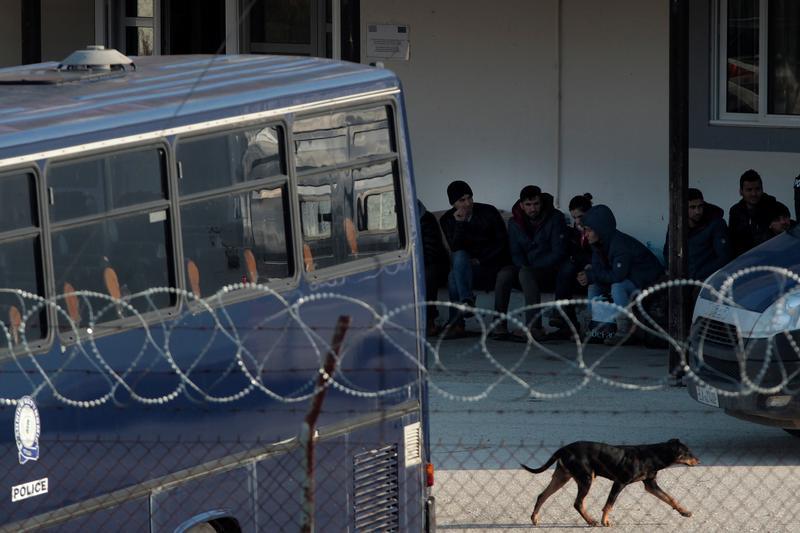HUMAN RIGHTS WATCH
Έγκυες Γυναίκες και Αλλες Ευάλωτες Ομάδες Στερούνται Υγειονομικής Περίθαλψης και Υποστήριξης
Έγκυες Γυναίκες και Αλλες Ευάλωτες Ομάδες Στερούνται Υγειονομικής Περίθαλψης και Υποστήριξης
 |
Οι μετανάστες που διέσχισαν τα χερσαία σύνορα μεταξύ Ελλάδας και Τουρκίας εμφανίζονται στο Προαναχωρητικό Κέντρο Κράτησης στο χωριό Φυλάκιο, Βόρεια Ελλάδα, 24 Φεβρουαρίου 2017.
© 2017 Alexandros Avramidis /Reuters |
(Αθήνα) – Χιλιάδες μετανάστες και αιτούντες άσυλο στη
βόρεια Ελλάδα υπόκεινται
σε άθλιες συνθήκες υποδοχής και κράτησης, με τις ομάδες που διατρέχουν
κίνδυνο να στερούνται της απαραίτητης προστασίας, ανέφερε σήμερα η Human
Rights Watch. Η Ελλάδα δεν έχει καν διασφαλίσει την τήρηση των ελάχιστων
προτύπων για εγκύους, νέες μητέρες και άλλους που έχουν φθάσει μέσω των
χερσαίων συνόρων της με την Τουρκία στην περιοχή του Έβρου, πολλοί από τους
οποίους έχουν διαφύγει από τη βία ή την καταστολή στις πατρίδες τους,
συμπεριλαμβανομένης της Συρίας, του Αφγανιστάν και του Ιράκ.
Κατά
τη διάρκεια επισκέψεων σε τρία κέντρα υπό κρατική διαχείριση όπου κρατούνται
αιτούντες άσυλο και μετανάστες τον Μάιο του 2018, η Human Rights Watch
διαπίστωσε πως οι συνθήκες διαβίωσης δεν πληρούν τα διεθνή πρότυπα. Και οι
τρεις εγκαταστάσεις στερούνται επαρκούς πρόσβασης σε υγειονομική περίθαλψη,
συμπεριλαμβανομένης υγειονομικής φροντίδας και στήριξης ατόμων που διατρέχουν
κίνδυνο, μεταξύ αυτών και γυναικών που ταξιδεύουν ασυνόδευτες, εγκύων, νέων
μητέρων και θυμάτων σεξουαλικής βίας. Η έλλειψη διερμηνέων αποτελεί τροχοπέδη
στην ουσιαστική επικοινωνία. Οι αιτούντες άσυλο και οι μετανάστες δεν γνώριζαν
ούτε καν τον λόγο κράτησής τους. Όσοι παραχώρησαν συνέντευξη ανέφεραν
λεκτική βία από πλευράς της αστυνομίας, ενώ δύο είπαν ότι είδαν την αστυνομία
να προβαίνει σε σωματική κακοποίηση άλλων.
«Μας είπαν ότι έτυχαν τόσο κακής μεταχείρισης σε αυτές τις εγκαταστάσεις που αισθάνθηκαν απαξιωμένοι», είπε η Hillary Margolis, ερευνήτρια για τα δικαιώματα των γυναικών στην Human Rights Watch. «Η Ελλάδα έχει την ευθύνη να τηρεί τα βασικά πρότυπα φροντίδας για όλους υπό την επίβλεψή της, ασχέτως της μεταναστευτικής ιδιότητάς τους».
«Μας είπαν ότι έτυχαν τόσο κακής μεταχείρισης σε αυτές τις εγκαταστάσεις που αισθάνθηκαν απαξιωμένοι», είπε η Hillary Margolis, ερευνήτρια για τα δικαιώματα των γυναικών στην Human Rights Watch. «Η Ελλάδα έχει την ευθύνη να τηρεί τα βασικά πρότυπα φροντίδας για όλους υπό την επίβλεψή της, ασχέτως της μεταναστευτικής ιδιότητάς τους».
49
αιτούντες άσυλο και μετανάστες στις τρεις αυτές δομές, καθώς και ελληνικές
αρχές και προσωπικό δομών παραχώρησαν συνεντεύξεις στη Human Rights Watch. Οι
συνθήκες ήταν ιδιαιτέρως κακές στο προαναχωρησιακό κέντρο κράτησης στο Φυλάκιο,
όπου οι ίδιοι οι ερευνητές της Human Rights Watch είδαν τους αιτούντες άσυλο να
κρατούνται σε σκοτεινά και υγρά κρατητήρια, με μεγάλη δυσοσμία στους
διαδρόμους. Αιτούσες άσυλο και μετανάστριες κρατούνταν μαζί με άνδρες μη
συγγενείς τους τόσο στο προαναχωρησιακό κέντρο όσο και στο κέντρο υποδοχής και
ταυτοποίησης στο Φυλάκιο, όπου οι χώροι στέγασης υπολείπονται βασικών προτύπων,
όπως η ύπαρξη αποχωρητηρίων και κλειδαριών στις πόρτες. Οι εργαζόμενοι και στα
δύο κέντρα στο Φυλάκιο επιβεβαίωσαν πως οι συνθήκες παραμένουν ίδιες στα τέλη
Ιουλίου. Κατά τον χρόνο επίσκεψης της Human Rights Watch στην ανοιχτή δομή στα
Διαβατά, οι αιτούντες άσυλο και οικογένειες μεταναστών στεγάζονταν μαζί σε
υπερπλήρη δωμάτια και ορισμένοι σε αντίσκηνα, συμπεριλαμβανομένων εγκύων και
νέων μητέρων.
Μία
σημαντική αύξηση των αφίξεων στον Έβρο την άνοιξη του 2018, με αιχμή τον
Απρίλιο, επιβράδυνε τις διαδικασίες υποδοχής και ταυτοποίησης,
με αποτέλεσμα υπερπλήρεις δομές και μεγαλύτερη διαμονή σε αυτές. Ωστόσο, αυτό
δεν απαλλάσσει την ελληνική κυβέρνηση από τις υποχρεώσεις της να σέβεται τα
δικαιώματα όλων των αιτούντων άσυλο και μεταναστών, συμπεριλαμβανομένης της
παροχής αξιοπρεπών προτύπων διαβίωσης και υγειονομικής περίθαλψης.
Για
όσο χρόνο εκκρεμούν οι διαδικασίες υποδοχής και ταυτοποίησης, οι Ελληνικές
αρχές κρατούν στην βόρεια Ελλάδα τους νεοαφιχθέντες παράτυπους μετανάστες και
εκείνους που αιτούνται διεθνή προστασία σε μία από τις ακόλουθες δομές: σε
τμήματα συνοριακής φύλαξης στην περιοχή του Έβρου, στο προαναχωρησιακό κέντρο
κράτησης στο Φυλάκιο υπό τη διαχείριση της Ελληνικής Αστυνομίας και στο κέντρο υποδοχής και ταυτοποίησης στο
Φυλάκιο, υπό τη διαχείριση του Υπουργείου Μεταναστευτικής Πολιτικής. Ορισμένοι
έπειτα μεταφέρονται σε ανοιχτές δομές, συμπεριλαμβανομένου του καταυλισμού στα
Διαβατά στην Θεσσαλονίκη, υπό τη διαχείριση του Υπουργείου Μεταναστευτικής
Πολιτικής, και άλλοι σε χώρους στέγασης που υποστηρίζονται από την Ύπατη
Αρμοστεία του ΟΗΕ για τους πρόσφυγες. Ορισμένοι παραμένουν υπό κράτηση καθ’όσο
χρόνο εκκρεμούν οι αιτήσεις ασύλου, απέλασης ή εθελούσιας επιστροφής.
